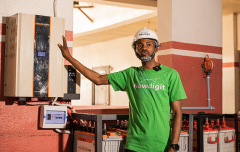Nigeria’s E-Mobility Surge to Lower Emissions, Cut Costs, and Spur Economic Growth
A new study by RMI and Nigeria Energy Transition Office charts a path to sustainable and equitable transportation solutions
Abuja, Nigeria – September 19, 2024: A new report by Sustainable Energy for All’s Nigeria Energy Transition Office (ETO) and RMI (founded as Rocky Mountain Institute), reveals Nigeria’s vast potential to harness economic growth through the production and adoption of electric vehicles (EVs).
By implementing supportive policies, fostering domestic EV assembly and manufacturing, and expanding charging infrastructure powered by reliable energy sources, Nigeria can accelerate its EV transition. With tailored de-risking of EV financing, the country can unlock significant long-term savings, positioning itself as a leader in sustainable transportation.
As Africa’s most populous nation, Nigeria’s economy heavily depends on oil, gas, and agriculture. However, its transportation sector, critical for economic development, faces mounting challenges - particularly as transportation costs rise after the removal of the fuel subsidy. Despite these hurdles, Nigeria has immense untapped potential to revolutionize its transportation landscape with electric mobility, and create jobs, reduce pollution, and ensure a more affordable and sustainable future for its citizens.
Lolade Abiola, Programme Manager, Energy Transition Office Nigeria, stated, "Electric mobility holds the key to Nigeria's sustainable future, offering not just cleaner transport solutions but also paving the way for technological advancement and energy security."
The report emphasizes the need for swift adoption of EVs, including two- and three-wheelers, to offer clean, affordable, and reliable transportation options that improve daily life for Nigerians. Accelerating this transition will generate green jobs, bolster the economy, and improve public health outcomes. Transportation electrification is a key component of Nigeria's broader decarbonization strategy. At COP26, Nigeria committed to achieving carbon neutrality by 2060. Its Energy Transition Plan (ETP) outlines an ambitious goal to deploy 13 million electric vehicles - 60% of the country's total vehicles - by 2050, with 100% deployment by 2060.
Kelly Carlin, Manager, RMI Carbon-Free Transportation Program, noted, "RMI’s analysis shows there’s a tremendous and immediate opportunity for Nigeria to lead in the transition to EVs, and for Nigerians to benefit from the rapidly growing cost-savings of e-mobility over traditional gas-powered vehicles."
The report offers actionable recommendations for public and private stakeholders to propel Nigeria's EV adoption, including:
- Implement favorable EV policies: Adopt fiscal and non-fiscal policies to fast-track EV deployment and support industry growth.
- Expand EV access: The Nigerian manufacturing sector, with government backing, is well-positioned to capture the last stages of the EV supply chain, especially in final assembly.
- Establish EV finance facilities: Affordability is key to driving market growth, with financing solutions critical to accelerating adoption.
- Build charging infrastructure: Reliable, accessible, and scalable charging infrastructure is essential for the success of Nigeria’s e-mobility sector.
- Foster public-private collaboration: Strong partnerships between government and businesses will create a sustainable, thriving EV ecosystem.
- Raise awareness: Promoting the benefits of transportation electrification will encourage smaller fleets and stakeholders to embrace e-mobility solutions.
With its economic strength and regional influence, Nigeria has the potential to not only improve the lives of its own citizens but also to serve as a model for other countries, demonstrating how sustainable transportation can drive economic and social progress.
Download the full report here: https://rmi.org/insight/nigeria-mobility-support/
For media inquiries please contact:
Sherry Kennedy, Communications Director, Sustainable Energy for All (SEforALL)
T: +43 676 846 727 237 E: Sherry.Kennedy@SEforALL.org
Benson Kibiti, Sr. Strategic Communications Manager, RMI
T: +254720 658597 E:bkibiti@rmi.org or RMI’s media team media@rmi.org
Notes to Editors
RMI’s Clay Stranger, Managing Director, RMI Carbon-Free Transportation Program, and Lolade Abiola, Programme Manager, Energy Transition Office Nigeria, are available for comments.
About SEforALL
Sustainable Energy for All (SEforALL) is an independent international organization that works in partnership with the United Nations and leaders in government, the private sector, financial institutions, civil society and philanthropies to drive faster action on Sustainable Development Goal 7 (SDG7) – access to affordable, reliable, sustainable and modern energy for all by 2030 – in line with the Paris Agreement on climate change. SEforALL works to ensure a clean energy transition that leaves no one behind and brings new opportunities for everyone to fulfil their potential. Learn more about our work at www.SEforALL.org
About RMI
RMI, founded in 1982 as Rocky Mountain Institute, is an independent nonprofit that transforms global energy systems through market-driven solutions to align with a 1.5°C future and secure a clean, prosperous, zero-carbon future for all. We work in the world’s most critical geographies and engage businesses, policymakers, communities, and NGOs to identify and scale energy system interventions that will cut climate pollution at least 50 percent by 2030. RMI has offices in Basalt and Boulder, Colorado; New York City; Oakland, California; Washington, D.C.; Abuja, Nigeria; and Beijing. More information on RMI can be found at www.rmi.org or follow us on Twitter @RMIAfrica.



